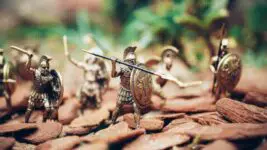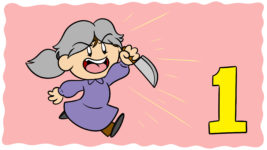Any writer worth their salt knows that characters are at the center of good fiction. You can write the best story in the world but, if your characters are flat stereotypes, no one’ll even make it to the end. Characters breathe life into your fiction, they populate the worlds you create, and they drive the plot forward. They’re the most vital thing to get right in your own writing – but, of course, that’s easier said than done.
One trap writers often fall into when writing their characters is crafting protagonists who, despite whatever personal flaws they ostensibly possess, are apparently incapable of ever failing in their endeavors. They don’t even seem to try – they just follow the narrative arc and things seem to fall into place around them. Your story’s world is broken, and the protagonist – by their mere presence alone – is the solution.
If your protagonist succeeds just because you let them, their story wasn’t worth reading.Click To TweetThere are many problems with this dynamic: character development suffers, your world becomes just a crutch to prop up your protagonist, the stakes of your plot are lowered, and tension fades. All of this conspires to make your book far less engaging to discerning readers, which is obviously bad news.
Instead of success, effort is what counts. Whether it’s present or absent in your characters, it says a whole lot about them and presents fantastic opportunities to develop your characters and advance your plot, even if failure is ultimately on the cards.
Make your characters complex
The key to successful character development is recognizing that complexity is vital. After all, your characters are human beings (and even if they’re not, it’s best to assume they’re as complex as human beings) and, as such, they need to be as changeable, irrational, well-meaning, brave, and maddeningly frightened as your typical mortal.
A key part of complexity is imperfection. But how should that imperfection manifest in your characters?
Well, one vital method is to ensure that your characters are flawed. These flaws should be rooted deep in your characters’ personality and psychology, and should be in addition to any physical or social flaws you decide to throw in. Maybe your hero is bold to the point of foolhardiness, and ends up taking stupid risks that frequently go wrong, or maybe she’s a coward too scared to begin her own quest.
Your characters’ flaws should shape their actions and their failures, otherwise they’re affectations.Click To TweetWeakness vs failure
Of course, writing flawed characters is only one step forward. A mistake many writers make is to assume that, since they’ve ensured their protagonist has an appropriate number of psychological/physical flaws, they can then get away with having that same protagonist sail through every challenge in their way without a hitch.
This won’t do: it’s all well and good to tell your readers that your characters are flawed, but without having them actually fail in concrete situations, that’s all you’re doing: telling. And you all know the old writers’ adage: show, don’t tell!
Introducing failure to your narrative establishes stakes and increases tension.Click To TweetFailure thus becomes a vital way to communicate your characters’ humanity. But, more than that, it communicates the stakes of your plot; it shows the reader that your fiction means business, that actually the central conflict is serious, that your characters could fail at any time. Think about George R. R. Martin’s A Song of Ice and Fire series: the plotlines and the world of Westeros are so engaging because they feel just as uncertain and scary as real life. The sense of danger is palpable only because characters frequently embark upon quests fueled by noble intentions only to fail or contract some horrible plague or get imprisoned or tortured, their missions unfulfilled.
What makes a good failure?
Failure in fiction is multi-faceted: it’s a plot event and so drives the plot forward, but it also signals a serious change in the characters involved. Failure marks a rare opportunity in fiction that shouldn’t be missed: the opportunity to show your readers what your characters are made of (you might even call it a crucible). Kurt Vonnegut famously advised writers to:
Be a sadist. No matter how sweet and innocent your leading characters, make awful things happen to them – in order that the reader may see what they are made of.
– Kurt Vonnegut
This is where effort comes in. Effort has, presumably, been the driving force that led your protagonist to fail in the first place. After all, you can’t fail without trying, so we can take it as a given that they’ve tried. How they respond after their efforts come to naught says more about a character (or indeed a person) than they’re willing to say about themselves.
Do they crumble, swallowed by self-doubt and self-pity? Do they get angry and turn on their allies, blaming everyone but themselves? Or do they pick themselves up, dust themselves off, and try again?
The answer to these questions will of course depend on context. An idealistic but cowardly protagonist, for example, may retreat after an early-book, low-stakes failure, but in more important conflict may find their idealism overcoming their cowardice. In this way, failure and the question of effort bind character and plot in a symbiotic relationship that helps deliver a cohesive and believable final story.
The reader
A great piece of writing advice is to never forget the reader, and this pointer is especially valid when it comes to plotting failures and dynamics of effort. After all, the level of effort a character puts in after failing or when chasing success will fundamentally change how your readers respond to that character.
Effort endears a character to the reader, regardless of the result.Click To TweetIf you can predict these responses, you gain a measure of control over how readers emotionally respond to your story. Think of how J. R. R. Tolkien does this in The Fellowship of the Ring: he knows that his readers will lose faith in Boromir after he betrays the fellowship and tries to take the ring from Frodo. This is his failure. But Tolkien uses this slump in his readers’ opinion to set up the climactic scene of the entire book: Boromir’s redemption and sacrifice.
This scene wouldn’t have worked nearly as well if Boromir hadn’t betrayed Frodo earlier. If he’d stayed loyal throughout and returned to fight and die for the hobbits, there’d be no change, no character development, no conflict, and Tolkien would have missed out on an opportunity to emphasize the stakes of the conflict. After all, Boromir’s demons haven’t left him; the ring is still exerting power over him – but he recognizes that the stakes are too high for him to fail. He has to go on. And because Boromir recognizes that the stakes are high, that the conflict is real and deadly, so too does the reader. This is how to use character failure to engage your readers.
Go forth and fail
The thing about failures is that they make your characters’ eventual triumphs that much sweeter. If it seems like a character hasn’t adequately bled for their reward, readers find it difficult to engage and empathize; after all, in the real world, nothing comes easily.
It’s vital to be aware of what your characters are saying about themselves through how much effort they put into their missions. By carefully dictating your characters’ responses to failure and their levels of effort, you’re able to subtly guide your readers through the ups and downs of your story, encouraging emotional responses and heightened engagement. Perfect!
What are your favorite examples of characters’ failures? How do your characters pick themselves up after they’ve failed? Let us know in the comments, and check out Why Your Characters Need To Have A Goal and How Shame And Vulnerability Make Your Characters Compelling for more great advice.





